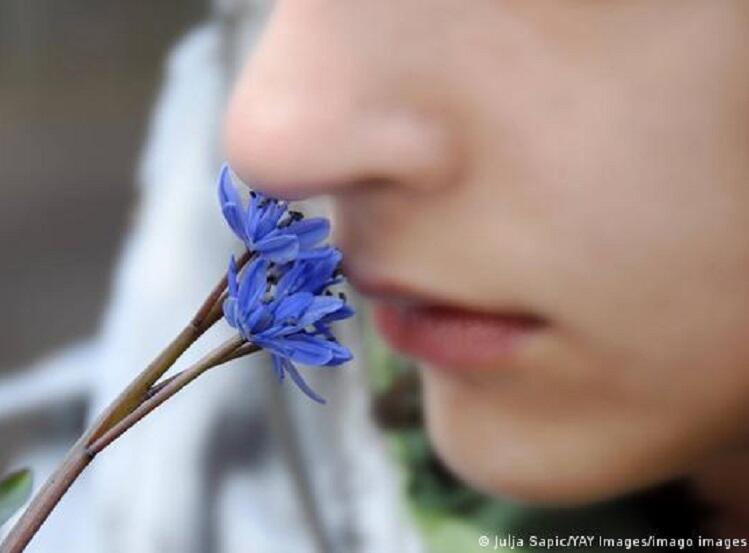At first, she didn’t feel anything, but after a few days, Belgian Anne-Sophie Lorquin realizes that something very important was missing in her life. Her breakfast no longer smelled of roasted beans, her soap did not smell of lavender and roses, and her fridge basil had no scent. Instead, there was nothing boring.
When she tested positive for covid-19 in late October 2020, she was infinitely tired. And immediately the sense of smell completely disappeared. Almost six months later, he said in his apartment in Brussels: “Sometimes I think I have some kind of depression.”
After a while, some of the odors came back and tarnished many of them. The technical term for this is parosmia, which is an olfactory disorder, as opposed to the loss of the sense of smell, which denotes a loss of the sense of smell.
Smelly flowers
A few months ago, Anne Sophie denied all the scents she loved so much from her environment. Boyfriend perfume, scented lipstick, scented candles and perfume set. For her, the aroma turned into a foul odor. Describes her favorite rose scent: “a kind of soiled nappy.”
Such as Changes in the sense of smell are one of the most common consequences of Covid-19Even if studies come to different conclusions regarding the proportion of those affected. So far, researchers have yet to reach a consensus on the exact cause.
Carolyn Howart, an otolaryngologist at the UCL Clinic in Brussels treats Anne Sophie and cites two possible reasons: Some studies have shown that the virus infects the cells that surround the olfactory neurons in the nose. Another hypothesis is that “the olfactory neurons themselves are under attack by the virus”. This will allow Sars-Cov-2 to penetrate directly into the olfactory bulb, between the nose and the brain.
Lost memories
Jean-Michel Millard understands very well what other Anne Sophie is feeling. After falling on his back and hitting his head over five years ago, the Frenchman lost his sense of smell completely.
What he misses the most are the scents of his children and wife, “in short, all the scents that make you feel alive.” And lost all the memories that he related to some smells, such as the smells that made him return to his grandmother’s bathroom, to elementary school, to his father.
Mayar doesn’t want to spoil his passion for cooking. Although his meals are now somewhat gray in taste: millions of olfactory cells in the nose determine the sense of taste in a critical way, so he must be satisfied with the salty and sweet flavors. In the kitchen of his Normandy home, he points to a bowl full of bright blue hearts. He admits that sweets are your lure now.
Anger turns
After the accident, Jean-Michel was very angry that no one could help him, although he consulted many experts. But at some point, anger and sadness turned into hope.
He found researchers from Germany and France who proposed his training: The solution for about 5% of French people who have odor problems is Experiment with concentrated scents.
And this is how Jean-Michel started it Train your nose. With coffee beans, rose, lemon and eucalyptus. In the morning, he can now make a very light aroma when he drinks his coffee. It is clear that, Despite training, he or she will notice only a small portion of what healthy individuals can smellr, because his ability to smell was severely damaged by the accident.
More than three years ago, he founded the Anosmie.org association to help others affected and explain how important and quality the sense of smell is, which “most people only discover after a loss.” In addition to being unable to smell pleasant scents, a lack of smell also means not being aware of even the smell of the body itself, nor the smells that signal a danger, such as smoke.
Even while awaiting the end of the epidemic soon, for Jean-Michel the subsequent interest in sense of smell and taste is a gift. Before, no one was too concerned with the suffering the anomaly caused, or not taken seriously, explains the French.
For more than a year, nearly every night he spent several hours in front of a computer, conducting videoconferencing on the topic, lobbying, and trying to motivate those who no longer suddenly smelled due to the coronavirus.
Closed eyes training
In Brussels, Anne-Sophie Lorquin is also training her nose with Dr. Caroline Howart. According to the expert, Studies show that the sense of smell delivers positive results over a period of a few months.
Perfect shape of Learning is trying to recognize smells twice a day with your eyes closed. The doctor explains: “It is very important to focus, because the brain must activate the memory of smells.”
In the case of Parosmia Anne Sophie, lack of distorted odors, the brain must learn that roses smell like roses, not sewage. Another flash of hope: olfactory cells regenerate regularly.
Anne Sophie says she still worries that she will not be able to smell like before. However, the possibility of an improvement gives you hope.

“Wannabe internet buff. Future teen idol. Hardcore zombie guru. Gamer. Avid creator. Entrepreneur. Bacon ninja.”

